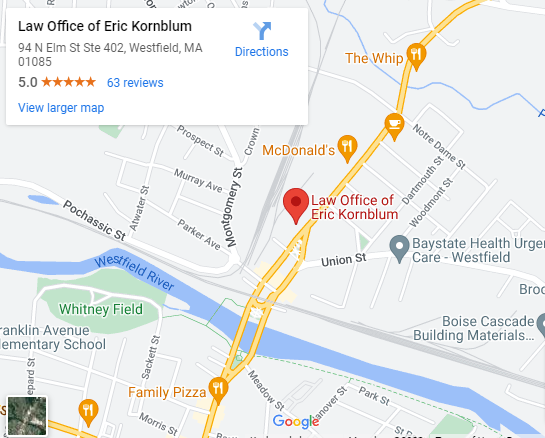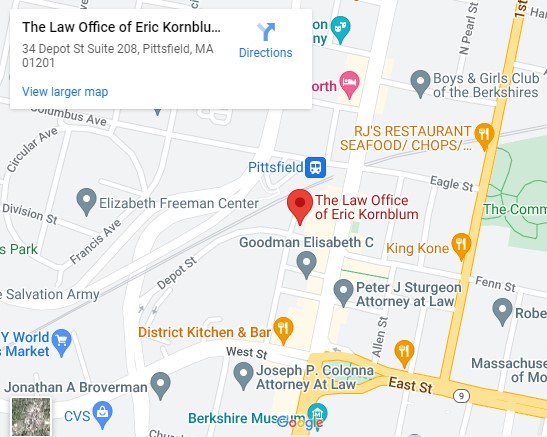Seek Legal Advice For Your Chapter 7 Bankruptcy Needs
Your financial future is in your hands, even when life throws you a curveball. While Chapter 7 bankruptcy can seem like the best option for you, it’s important to remember that this type of bankruptcy comes with exemptions. What are the exemptions in Chapter 7 bankruptcy, the various forms you need, eligibility requirements, and other things you need to know before going through this process?
Knowing the specifics of bankruptcy law will help you in making informed decisions when considering filing for Chapter 7 bankruptcy as part of your overall strategy for dealing with debt.
If you are planning to know more about what are the exemptions, schedule a conversation with our Massachusetts bankruptcy law firm today!
Why Do I Need a Chapter 7 Bankruptcy Lawyer in Westfield, MA?
Chapter 7 bankruptcy can be a tricky process. It’s important to know what properties are covered by bankruptcy exemptions. Exemptions allow debtors to keep some of their property and equity that would otherwise have to be sold off in order to pay creditors.
Each state has different exemption rules, but debtors are typically allowed certain amounts of home equity, money kept in bank accounts, furniture, and even cars up to a certain value.
All creditors must make sure they understand the bankruptcy exemption laws in their state thoroughly before applying for a Chapter 7 bankruptcy. This way, the debts that must be paid off can be minimized and financial security can be regained quickly. It would be best to contact an experienced attorney that can guide you throughout the process.
The Law Office of Eric Kornblum offers clients comprehensive guidance in Chapter 7 bankruptcy proceedings. If you don’t want to stress yourself, schedule a consultation with us today!
How To Apply For Chapter 7 Bankruptcy Exemptions?
Applying for exemptions in Chapter 7 of the Bankruptcy Code is an important step in gaining financial freedom. Because creditors have the right to seize assets from a debtor, exemptions give debtors the power to protect their property from potential repossession or liquidation.
Research State Exemptions
To begin the process, a debtor must research state exemption laws and compile a list of assets they intend to claim as exempt. Keep in mind that every state has its individual laws when it comes to Chapter 7 bankruptcy. Law Office of Eric Kornblum is here to help if you are in Westfield, Massachusetts.
Complete the Necessary Paperwork
The next thing that you’ll have to do is to complete the necessary paperwork which includes a Declaration of Exemptions form. This consists of all exempted assets with their values and any other information requested by the court.
Submit the Documents
Debtors must submit this paperwork and any necessary documentation to the court in a timely manner. This will ensure that your assets are protected once their case is approved and becomes active in federal court.
Our Westfield bankruptcy attorney from the Law Office of Eric Kornblum is here to guide you through each step of the way.
What Can I Keep With Exemptions in Chapter 7 Bankruptcy?
Chapter 7 bankruptcy exemptions are a great way for those dealing with overwhelming debt to be able to keep some of the property that may otherwise be put up for liquidation.
The exact amount of property one may keep using these exemptions can vary from state to state, so it is important to research what category each state falls under when considering filing for bankruptcy. Generally, the debtor does not get complete freedom and must adhere to certain limits for various assets they could keep which may include:
- Home equity
- Value of a car
- Jewelry
- Clothing
- Some household goods
- Retirement account
- Major insurances
- Public benefits
Some debtors find it helpful to consult an attorney specializing in bankruptcy who can help them understand exactly how much they are able to keep. If you are having a difficult time knowing what should be included in Chapter 7 exemptions, the Law Office of Eric Kornblum is always here to assist you!
What Are Wildcard Exemptions in Chapter 7
Filing for a Chapter 7 bankruptcy is often an essential step in the process of restructuring debt and getting a fresh financial start. Fortunately, the law provides an additional layer of protection to certain types of property by way of wildcard exemptions.
Wildcard exemptions are an exception to the rule that all property owned by a debtor is subject to liquidation in Chapter 7 bankruptcy proceedings. They act as a safeguard when standard exemptions do not apply, providing individuals with some sense of security that their most important assets are safe from creditors even under strict bankruptcy laws.
While the specifics concerning wildcard exemptions may differ from one jurisdiction to another, they can be a lifeline for individuals who have gone through difficult financial hardship and need extra protection when filing for Chapter 7.
What Are the Alternatives to Exemptions in Chapter 7 Bankruptcy
In a Chapter 7 bankruptcy case, exemptions allow debtors to keep certain property and assets from being sold to repay creditors. However, in some cases, debtors may not be able to use exemptions, or their exemptions may not cover all of their assets. In these situations, there are several alternatives that debtors may consider:
- Negotiate with creditors: Debtors may be able to negotiate with their creditors to work out a payment plan or settle their debts for less than what is owed.
- Convert to Chapter 13 bankruptcy: If a debtor does not qualify for Chapter 7 bankruptcy or has non-exempt assets that they wish to keep, they may be able to convert their case to Chapter 13 bankruptcy. In Chapter 13, debtors make payments to a trustee over a three to five-year period to repay their debts.
- Sell assets: Debtors may choose to sell non-exempt assets and use the proceeds to pay off their debts.
- File for Chapter 11 bankruptcy: This option is typically reserved for businesses, but individuals with a significant amount of debt may be able to file for Chapter 11 bankruptcy. In Chapter 11, debtors work with their creditors to come up with a reorganization plan that allows them to continue operating while repaying their debts.
- Explore state law exemptions: While federal law sets minimum exemption amounts, some states have their own exemption laws that may be more generous. Debtors may be able to use state law exemptions instead of federal law exemptions.
It is important to note that the decision to file for bankruptcy and the choice of which type of bankruptcy to file for can have significant consequences on a person’s credit, financial future, and overall well-being.
Therefore, it is recommended that individuals consult with an experienced bankruptcy attorney before making any decisions about filing for bankruptcy or pursuing any of the alternatives listed above.
Call Our Seasoned Chapter 7 Bankruptcy Attorney In Westfield, MA Now!
Everyone has the right to be protected under bankruptcy law, however, it may not always be a clear-cut path. To ensure you are filing correctly and are taking advantage of all potential exemptions, it is important to consult a lawyer for proper legal advice.
Chapter 7 is one of the most commonly used bankruptcies due to its ability to discharge many debts entirely. Consulting with a lawyer in Westfield, MA will help you navigate any special cases or situations that may come up when filing for exemptions. A bankruptcy lawyer at the Law Office of Eric Kornblum can provide insight into what is exempt versus non-exempt assets and guide you on the process accordingly.
Want to learn more about what are the exemptions in Chapter 7 bankruptcy? Call us today to schedule a consultation with our lawyer.

 MA bankruptcy lawyer Eric Kornblum graduated from State University of New York, Binghamton in 1989 and received his law degree in 1992 at Western New England College, School of Law. Since opening his own practice, Eric has been dedicated to helping his clients resolve their financial problems both in and out of court.
MA bankruptcy lawyer Eric Kornblum graduated from State University of New York, Binghamton in 1989 and received his law degree in 1992 at Western New England College, School of Law. Since opening his own practice, Eric has been dedicated to helping his clients resolve their financial problems both in and out of court. 
